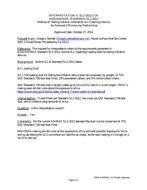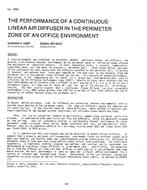Reports findings and insights from six field studies of supermarket air conditioning systems equipped with heat pipe heat exchangers (HPHX). The field tests examined different store and heating, ventilating, and air conditioning (HVAC) system design operating in four different climates. Two basic HVAC configurations were tested – single-path and dual-path. Each site was well-instrumented and included an on-site data acquisition system with remote data retrieval. Substantial savings in refrigeration energy were found to be achievable with a reduction of indoor humidity in supermarkets. Results thus far indicate a mean refrigeration energy saving of 0.65% per degree Fahrenheit (1.4%/day/deg C) of indoor dew-point reduction (in the range of 50 deg F (10 deg C) dew point. While HVAC energy consumption and demand increased at the lower indoor dew-point control, settings, site-to-site variations in thermal loads were found to affect energy consumption and demand as much as indoor dew-point setpoint. The complexities of determining the magnitude and source cooling load components prevented the drawing of any general conclusions on the net benefits of the application of HPHXs and reduced indoor dew point.
KEYWORDS: performance, supermarkets, air conditioning, testing, heat exchangers, humidity, refrigeration, energy consumption, energy conservation, dew point, heat load, cooling load, USA, space cooling, buildings, dehumidifying, heat pipes, moisture, condensation.
Citation: Symposium, ASHRAE Transactions 1993, Vol.99, pt.1
Product Details
- Published:
- 1993
- Number of Pages:
- 16
- File Size:
- 1 file , 2 MB
- Product Code(s):
- D-18276


